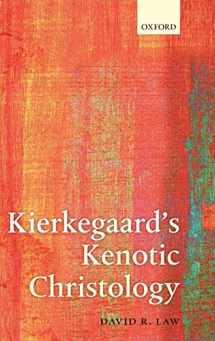
Kierkegaard's Kenotic Christology
ISBN-13:
9780199698639
ISBN-10:
0199698635
Edition:
1
Author:
David R. Law
Publication date:
2013
Publisher:
Oxford University Press
Format:
Hardcover
328 pages
FREE US shipping
Book details
ISBN-13:
9780199698639
ISBN-10:
0199698635
Edition:
1
Author:
David R. Law
Publication date:
2013
Publisher:
Oxford University Press
Format:
Hardcover
328 pages
Summary
Kierkegaard's Kenotic Christology (ISBN-13: 9780199698639 and ISBN-10: 0199698635), written by authors
David R. Law, was published by Oxford University Press in 2013.
With an overall rating of 4.2 stars, it's a notable title among other
books. You can easily purchase or rent Kierkegaard's Kenotic Christology (Hardcover) from BooksRun,
along with many other new and used
books
and textbooks.
And, if you're looking to sell your copy, our current buyback offer is $0.3.
Description
The orthodox doctrine of the incarnation affirms that Christ is both truly divine and truly human. This, however, raises the question of how these two natures can co-exist in the one, united person of Christ without undermining the integrity of either nature. Kenotic theologians address this problem by arguing that Christ 'emptied' himself of his divine attributes or prerogatives in order to become a human being. David R. Law contends that a type of kenotic Christology is present in Kierkegaard's works, developed independently of the Christologies of contemporary kenotic theologians. Like many of the classic kenotic theologians of the 19th century, Kierkegaard argues that Christ underwent limitation on becoming a human being. Where he differs from his contemporaries is in emphasizing the radical nature of this limitation and in bringing out its existential consequences. The aim of Kierkegaard's Christology is not to provide a rationally satisfying theory of the incarnation, but to highlight the existential challenge with which Christ confronts each human being. Kierkegaard advances 'existential kenoticism', a form of kenotic Christology which extends the notion of the kenosis of Christ to the Christian believer, who is called upon to live a life of kenotic discipleship in which the believer follows Christ's example of lowly, humble, and suffering service. Kierkegaard thus shifts the problem of kenosis from the intellectual problem of working out how divinity and humanity can be united in Christ's Person to the existential problem of discipleship.


We would LOVE it if you could help us and other readers by reviewing the book
Book review

Congratulations! We have received your book review.
{user}
{createdAt}
by {truncated_author}


